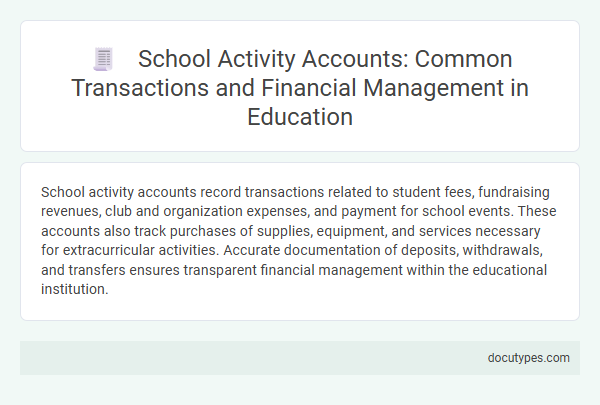School activity accounts record transactions related to student fees, fundraising revenues, club and organization expenses, and payment for school events. These accounts also track purchases of supplies, equipment, and services necessary for extracurricular activities. Accurate documentation of deposits, withdrawals, and transfers ensures transparent financial management within the educational institution.
Introduction to School Activity Accounts
School activity accounts track the financial transactions related to student organizations and extracurricular activities. These accounts help ensure transparency and proper management of funds generated and spent within schools.
- Incoming Funds - Transactions include deposits from fundraising events, student dues, and donations received by school clubs.
- Expenditures - Payments for supplies, event costs, and equipment purchases are recorded to monitor how funds are utilized.
- Transfers and Adjustments - Internal transfers between accounts and corrections of errors ensure accurate financial reporting in school activity accounts.
Purpose and Importance of Activity Accounts in Schools
School activity accounts record financial transactions related to various student organizations, clubs, and extracurricular activities, ensuring transparency and accountability. These accounts track income from fundraising, membership fees, and event proceeds, as well as expenditures for supplies, equipment, and event costs. Maintaining accurate activity accounts is essential to manage budgets effectively and support the diverse programs that enhance student engagement and learning experiences, helping Your school foster a well-rounded education.
Common Transactions in School Activity Accounts
School activity accounts typically record transactions related to student organizations, fundraising events, and extracurricular activities. Common transactions include deposits from membership fees, payments for event supplies, and disbursements for club activities or trips. These accounts help maintain transparent financial records for all student-led initiatives and activities.
Managing Receipts and Deposits
| Transaction Type | Description | Examples |
|---|---|---|
| Receipts | All incoming funds received by the school activity account. Proper recording ensures accurate tracking of funds and accountability. | Entry fees, fundraising proceeds, donations, sponsorship payments, and school event ticket sales. |
| Deposits | Funds transferred into the school activity account, often aggregated from multiple receipts before bank deposits. Timely deposits help maintain transparency and reduce cash handling risks. | Cash collected at events, checks from sponsors, online payment transfers, and collected fees from students. |
| Expense Payments | Monies paid out from the account for approved school activity expenses. Including these ensures a clear record of fund usage. | Purchasing supplies, paying for event services, transportation costs, and awards or prizes. |
| Reconciliations | Periodic matching of recorded receipts and deposits against bank statements to ensure accuracy and detect discrepancies. | Monthly account reviews, audit preparations, and financial report generation. |
Proper management of receipts and deposits in school activity accounts allows you to maintain precise financial records, ensuring accountability and fostering trust among students, parents, and staff.
Handling Disbursements and Payments
What types of transactions are recorded in school activity accounts when handling disbursements and payments? School activity accounts typically record expenditures such as event costs, supply purchases, and service fees. Your careful tracking of these payments ensures accurate financial management and accountability within the school organization.
Recordkeeping Best Practices for Schools
School activity accounts record various transactions, including student fees, fundraising revenues, and expenditures for supplies or events. Accurate documentation of deposits, disbursements, and transfers ensures financial transparency.
Maintaining organized records with receipts, invoices, and bank statements supports audit compliance and accountability. You should implement routine reconciliations and use standardized forms to enhance recordkeeping best practices in educational settings.
Financial Reporting and Reconciliation Procedures
School activity accounts record various financial transactions that reflect the inflow and outflow of funds related to extracurricular and co-curricular programs. Accurate financial reporting and reconciliation procedures ensure transparency and accountability in managing these accounts.
- Revenue Transactions - Includes all income sources such as fundraising proceeds, membership fees, and sales of merchandise or tickets.
- Expenditure Transactions - Covers payments for supplies, event costs, equipment purchases, and other related expenses.
- Transfer and Adjustment Transactions - Encompasses inter-account transfers, corrections, and year-end reconciliations to maintain accurate records.
These transaction types facilitate comprehensive financial reporting and streamlined reconciliation processes within school activity accounts.
Compliance and Internal Controls in School Finance
School activity accounts record various financial transactions critical for maintaining compliance and strong internal controls in school finance. Accurate recording ensures transparency and accountability in handling funds related to student activities.
- Receipts from Fundraising Events - These transactions document all income generated from school-sponsored sales and events to ensure proper tracking and reporting.
- Expenditures for Supplies and Equipment - Expenses related to purchasing materials for clubs and activities are recorded to monitor budget adherence and prevent misuse of funds.
- Transfers and Deposits - Internal transfers between accounts and bank deposits are logged to maintain clear audit trails and support financial reconciliation processes.
Challenges and Solutions in School Account Management
School activity accounts record transactions such as fundraisers, club dues, event ticket sales, and expenditures for supplies or activities. These transactions require careful documentation to ensure transparency and accurate financial tracking.
Challenges in managing school accounts include inconsistent record-keeping, unauthorized expenditures, and difficulty reconciling multiple income sources. Implementing standardized accounting software and regular audits can improve accuracy and accountability in school financial management.
What Types of Transactions Are Recorded in School Activity Accounts? Infographic

